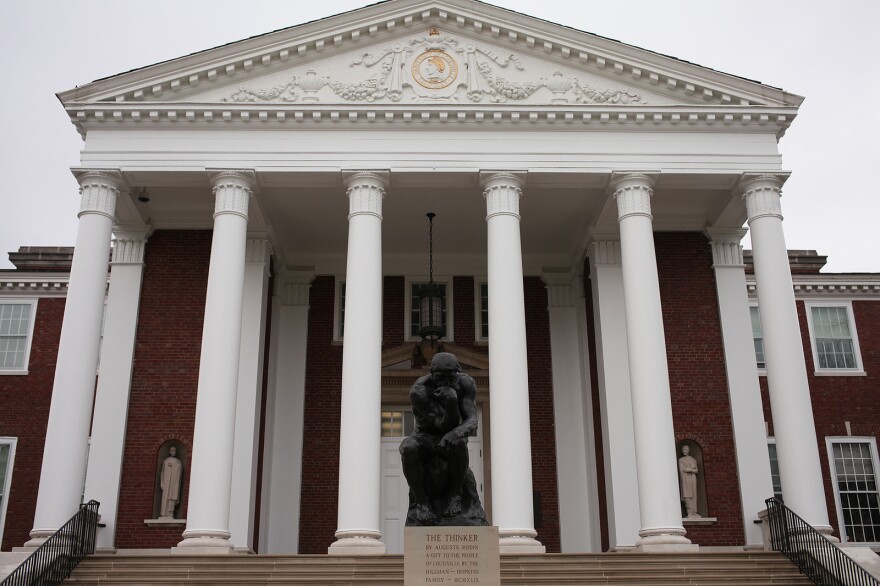A former top administrator at the University of Louisville has filed suit against the school’s board of trustees, alleging he was fired because he spoke out about health insurance bidding issues and racial discrimination of employees.
According to the complaint filed Tuesday in Jefferson County Circuit Court, Sam Connally, former vice president for human resources, claims the university violated Kentucky’s whistleblower statute and the state’s civil rights act.
An attorney hired by the university, however, determined in December that Connally’s claims were without merit.
Connally alleges that Provost Shirley Willihnganz retaliated against him because he complained that Humana Inc. received an unfair advantage in the bidding process for university health insurance. Connally alleges the school was planning to solicit David Jones, Sr., Humana’s founder, for a $10 million gift to U of L’s capital campaign.
“At the end of the day, it’s kind of hard to argue with $10 million,” the suit quotes Willihnganz as saying.
In 2012, the lawsuit states, U of L sought proposals for a healthcare provider for the following year. A preliminary assessment showed that the bid should be awarded to United Healthcare because of an estimated savings of $1.2 million over the bid submitted by Humana, the suit states.
A few days later, however, Connally alleges that Willihnganz disclosed to him that Michael McAllister, chairman and CEO of Humana, had written to President James Ramsey during the open bid process to complain about how the university’s benefit consultant evaluated the bids.
Connally alleges that Willihnganz made it clear that the administration wanted to extend “every possible courtesy to Humana in the selection of a health plan vendor since the university was planning to solicit David Jones, Sr. … for a $10 million gift.”
University spokesman Mark Hebert declined in an e-mail to comment. Connally’s attorney, Andrew Dutkanych III, did not immediately respond to a request for comment.
The complaint states that U of L increased employee health insurance premiums by $25 per employee per month (or $300 per employee per year), totaling $1.65 million per year for the 5,500 health plan participants. This took effect in Jan. 1, 2013. By June of that year, the plan had generated a surplus of $1.65 million.
Rather than return the excess premiums to employees or reduce premiums, U of L moved the money out of the health plan and spent it on non-health plan expenditures, Connally alleges in the suit.
As of June 2014, the health plan generated a surplus of $3.4 million, which according to Connally’s lawsuit,was also spent on non-health expenditures.
In October 2014, the plan was projected to generate an annual surplus of $1.75 million. Of that, $250,000 was allocated to offset minor enhancements to retiree health insurance, leaving a surplus of $1.5 million, according to the suit.
Connally alleges that Willihnganz wanted to consider another premium hike in 2015 “because university general fund budgets were exceedingly tight,” according to the lawsuit. Connally claims he argued that the school couldn’t raise rates without documenting the need based on actual increases in health plan costs.
Connally also asserts he was punished for speaking up in a separate matter. He alleges that the school made false statements to the U.S. Equal Employment Opportunity Commission, denying that black employees in the financial aid office had been discriminated against. Connally himself described their treatment as the “most extreme example of race discrimination” he had observed in more than 20 years as a university EEO officer.
Connally’s claims were previously deemed unfounded by an attorney hired by the school to investigate a formal retaliation complaint filed in October. The attorney, Thomas Williams, said Connally’s complaints “had no credible basis.”
The attorney noted that Connally waited more than two years to file a complaint about the health insurance plan bidding process. The investigation revealed that multiple people were involved in selecting a health care provider and that “Humana did not even receive the bid at issue.”
The investigation also found that Willihnganz had limited involvement with the discrimination claims from employees. “But even if she had been involved,” the report states, “the claims were resolved with negotiated agreements with the EEOC. There were no remaining issues open.”
Williams concluded: “It is apparent from the record that Connally makes his allegations against the provost when he knows his job is in jeopardy.”
Connally was hired by U of L in 2010 and had an annual salary of $192,890. The executive committee of U of L’s Board of Trustees ratified President Ramsey’s decision to fire him on Dec. 18.
Connally declined Wednesday afternoon to comment on the suit, in which he is seeking reinstatement to the university, as well as back pay and other damages.
Reporter Kristina Goetz can be reached at kgoetz@kycir.org or (502) 814.6546.
This story was reported by Louisville Public Media's Kentucky Center for Investigative Reporting.
Disclosure: In October 2014, the University of Louisville, which for years has donated to Louisville Public Media, earmarked $10,000 to KyCIR as part of a larger LPM donation. David Jones Sr., Humana's founder, is part of foundation that donated to KyCIR. Trustee Stephen Campbell has donated to KyCIR. See our About page for more information. Also, KyCIR has a pending civil lawsuit against the university regarding public records.





